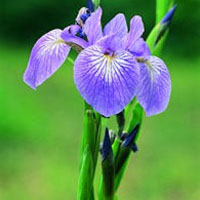Blue Flag
Uses
Parts Used & Where Grown
The rhizome, or underground stem, of the blue flag (indicating its showy blue flowers) is used medicinally. Blue flag and closely related species (particularly Iris missouriensis, western blue flag) grow across North America.
Our proprietary “Star-Rating” system was developed to help you easily understand the amount of scientific support behind each supplement in relation to a specific health condition. While there is no way to predict whether a vitamin, mineral, or herb will successfully treat or prevent associated health conditions, our unique ratings tell you how well these supplements are understood by the medical community, and whether studies have found them to be effective for other people.
For over a decade, our team has combed through thousands of research articles published in reputable journals. To help you make educated decisions, and to better understand controversial or confusing supplements, our medical experts have digested the science into these three easy-to-follow ratings. We hope this provides you with a helpful resource to make informed decisions towards your health and well-being.
3 StarsReliable and relatively consistent scientific data showing a substantial health benefit.
2 StarsContradictory, insufficient, or preliminary studies suggesting a health benefit or minimal health benefit.
1 StarFor an herb, supported by traditional use but minimal or no scientific evidence. For a supplement, little scientific support.
This supplement has been used in connection with the following health conditions:
| Used for | Why |
|---|---|
1 Star Impetigo Refer to label instructions | Some herbalists recommend topical application of fresh, sliced rhizomes (the underground stem of the blue flag) to the sores of impetigo, the common bacterial skin infection. Topical application of fresh, sliced rhizomes to the sores of impetigo (a common bacterial skin infection in children) has been recommended by herbalists. |
Traditional Use (May Not Be Supported by Scientific Studies)
Based on Native American traditions, Eclectic physicians (19th century doctors who relied on herbs) and herbalists used blue flag for a number of conditions. Of note was its use as a nonspecific immune enhancer, as a laxative, and to detoxify the intestinal tract.1 Topical application of fresh, sliced rhizomes to the sores of impetigo (a common bacterial skin infection in children) has been recommended by herbalists.2 Traditional herbalists have used blue flag to treat poor digestion characterized by fat malabsorption.
How It Works
How It Works
The resinous fraction of blue flag contains numerous phenolic glycosides. Traditional herbal texts suggest these constituents stimulate the parasympathetic nervous system, leading to production of bile, saliva, and sweat.3 However, modern clinical trials have not confirmed these effects for blue flag.
How to Use It
Herbalists sometimes recommend up to 10 drops of tincture of the dried rhizome be taken three times per day.4 The tea form is unlikely to be effective, since the active compounds in blue flag are not water soluble.
Interactions
Interactions with Supplements, Foods, & Other Compounds
Interactions with Medicines
Side Effects
Side Effects
Blue flag can cause nausea, vomiting, and loose stools if too much is taken.5 People should not exceed the recommended amounts. Fresh rhizome should only be applied topically and never taken internally, since it can irritate the mouth6 and is much more likely to cause nausea and diarrhea. Blue flag should only be taken on the advice of a physician or herbalist trained in its use. Blue flag is unsafe for use during pregnancy or breast-feeding. People should not give blue flag to children.
References
1. Ellingwood F. American Materia Medica, Therapeutics and Pharmacognosy, 11th ed. Sandy, OR: Eclectic Medical Publications, 1919, 1998, 312-3.
2. Moore M. Medicinal Plants of the Mountain West. Sante Fe: Museum of New Mexico Press, 1979, 39-40.
3. Moore M. Medicinal Plants of the Mountain West. Sante Fe: Museum of New Mexico Press, 1979, 39-40.
4. Ellingwood F. American Materia Medica, Therapeutics and Pharmacognosy, 11th ed. Sandy, OR: Eclectic Medical Publications, 1919, 1998, 312-3.
5. Ellingwood F. American Materia Medica, Therapeutics and Pharmacognosy, 11th ed. Sandy, OR: Eclectic Medical Publications, 1919, 1998, 312-3.
6. McGuffin M, Hobbs C, Upton R, Goldberg A (eds). American Herbal Product Association's Herbal Safety Handbook. Boca Raton, FL: CRC Press, 1997, 64.
Last Review: 05-12-2015

Copyright © 2024 TraceGains, Inc. All rights reserved.
Learn more about TraceGains, the company.
The information presented by TraceGains is for informational purposes only. It is based on scientific studies (human, animal, or in vitro), clinical experience, or traditional usage as cited in each article. The results reported may not necessarily occur in all individuals. For many of the conditions discussed, treatment with prescription or over the counter medication is also available. Consult your doctor, practitioner, and/or pharmacist for any health problem and before using any supplements or before making any changes in prescribed medications. Information expires December 2024.
This information does not replace the advice of a doctor. Healthwise, Incorporated, disclaims any warranty or liability for your use of this information. Your use of this information means that you agree to the Terms of Use. Learn how we develop our content.

